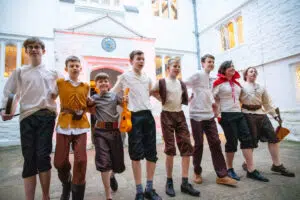A little of Paris came to Guildford this week with RGS Guildford’s MFL production of Le Bossu de Notre-Dame, an adaptation of Victor Hugo’s iconic gothic novel, brought the heart-wrenching tale of Quasimodo and Esmeralda to life with stunning individual artistry and emotional depth. For a story set in 1482, the intimate Tudor setting of the Old Building with its natural historical backdrop, intricate glass windows, and shadowy corners immediately immersed the audience in the haunting beauty of medieval Paris.
The cast delivered performances that were both powerful and poignant. Adrian Groenewald conveyed Quasimodo’s inner turmoil and longing for acceptance in a way that truly captivated the audience: a delicate balance of vulnerability and strength, a character to be both pitied and admired. His opening number Le Pape des Fous created a powerful bond with the audience. Charlotte Hampson shone as Esmeralda. Her portrayal of the gypsy girl was imbued with grace and sensitivity, bringing Esmeralda’s innocence and defiance to the forefront, creating a character that was both enchanting and heartbreaking. Her musical numbers were touchingly and sensitively performed, none more so than the hauntingly beautiful Il est beau comme le soleil and Ave Maria Païen. The joint numbers of Les oiseaux qu’on met en cage and Ma maison, c’est ta maison, as the story drew to a close, cemented these two engaging characters in the hearts of the audience.
The supporting cast also delivered remarkable performances. Ollie Southwell’s Frollo was a chilling embodiment of the multi-faceted nature of the complex character, torn by obsession and moral conflict, with the passionate Tu vas me détruire particularly arresting. Orlando Meadowcroft sparkled as the arrogant and self-aggrandising, yet equally comedic and likeable character Gringoire; his opening number Le temps des Cathédrales set the scene for the quality of performance that was to follow, while Nicko Lawrence was appropriately impulsive and dashing as Phoebus. The ensemble cast, including the lively troupe of gypsies and the solemn priests of Notre-Dame, added depth and vibrancy, energy and humour to the production; Oscar York’s vocals in particular were notable.
The actors impressed; the music, however, was equally compelling: the haunting melodies and powerful choruses echoed through the Old Building, enhancing the emotional impact of the story. Ruvin Meda – arranger, composer and conductor extraordinaire – and the talented band of musicians absolutely captured the zeitgeist of the time. In the first half, in particular, his flamboyant, expressive conducting style, framed by the doorway, created a mesmerising backdrop. As Quasimodo’s emotive final song Danse mon Esméralda drew to a close, the sustained applause from the appreciative audience was fully deserved for a quite remarkable musical masterpiece.
To perform such an iconic play is a challenge, to convey it so powerfully in French all the more challenging, and yet the talented cast navigated the challenges of intonation and nuance, connection and engagement with aplomb. A musical and dramatic tour de force, at times touching and sensitive, at others uplifting and forceful: the production conveyed the complex, but heart-rending web of love, hate, treachery, despair and obsession. An enchanting blend of visual impact, emotional intensity, and individual brilliance. Bravo!

